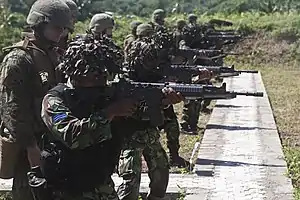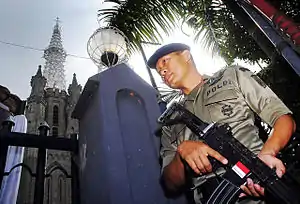Pindad SS1
The SS1 (short for Indonesian: Senapan Serbu 1, "Assault Rifle 1")[2] is the standard assault rifle of the Indonesian armed forces and Indonesian National Police. It is based on the FN FNC rifle but modified in order to meet ergonomic and tropical environment needs.[3]
| Pindad SS1-V1 | |
|---|---|
 The Pindad SS1-V1 | |
| Type | Assault rifle |
| Place of origin | Indonesia |
| Service history | |
| In service | 1991–present |
| Used by | See Users |
| Wars | Insurgency in Aceh Papua conflict East Timor Conflict Cambodian–Thai border stand-off Moro conflict Battle of Marawi[1] |
| Production history | |
| Designer | Fabrique Nationale |
| Designed | 1991 |
| Manufacturer | Pindad |
| Produced | 1991 |
| Variants | See Variants |
| Specifications | |
| Mass | 4.01 kg (unloaded) |
| Length | 997 mm |
| Cartridge | 5.56×45mm NATO |
| Caliber | 5.56mm |
| Action | Gas-Operated, rotating bolt |
| Rate of fire | 600–650 rounds/min |
| Muzzle velocity | 710 m/s |
| Effective firing range | 450 m |
| Feed system | Various STANAG magazines. |
| Sights | Iron sights, but optical sights are possible if a mount is present. Optical sight is a standard feature in SS1-V4 variant. |
The assault rifles are gas-operated automatic carbines with a foldable butt and are designed to meet the NATO standard. SS1 weapons are high performance light individual weapons that have been used by the Indonesian armed forces, including the Army, Navy, and Air Force, as well as police. It was adopted into Indonesian service in 1991.[4]
It is currently being phased out and replaced by the Pindad SS2.[5] The SS1 would possibly be used by reserve or paramilitary forces when the SS2 is fully adopted into service.[6]
The SS1 is manufactured by PT Pindad, Bandung, Indonesia under the license from Fabrique Nationale, Belgium.[2][7]
History
After 10,000 FN FNC rifles were bought for the Indonesian military, Pindad secured a license in 1984 from FN to manufacture the FNC.[3] Indonesia adopted the SS1s into official service by 1991.[4]
A recent seizure of Pindad SS1 rifles alongside P2 pistols in the Philippines has forced politicians to call on a special investigation on Pindad to whether weapon smuggling did take place according to Philippine customs officials.[8] The Indonesian government, in response, has made preparations to form a special agency to handle all overseas trade.[9] The Ministry of State Enterprises has conducted an investigation against Pindad over the seizure of Pindad-made firearms in the Philippines.[10]
Design

The external looks of the SS1s are strongly similar to the FN FNC, ranging from the pistol grip to the stock, receiver and barrel.[11] Optics can be mounted onto the SS1 rifles, but a special optic mount be installed first before any optic can be used.[11]
The SS1s are designed by Pindad to allow for the use of their own indigenous SPG-1A underbarrel grenade launcher, inserted underneath the barrel.[12] Most SS1 rifle models, with the exception of the SBC-1, are made with selective fire modes that consist of single, three round and full auto firing modes.[6]
Variants

- SS1-V1
- The V1 is the primary variant, and is most widely used by Indonesian regular infantry forces, with standard barrel and foldable butt.[13]
- SS1-V2
- The short-barreled and compact carbine variant.[14]
- SS1-V3
- Standard barrel with fixed butt.[15]
- SS1-V4
- The designated marksman rifle variant[2] similar to SS1-V1 except for the scope to extend the effective range during medium and long range firefights. Intended to be used similar in function to Dragunov Sniper Rifle.
- SS1-V5
- The smallest variant of SS1 with a 252 mm barrel and 3.37 kg weight with foldable butt. Used by engineers, artillery forces, rear-echelon troops and by special forces.[16]
- SS1-R5 Raider
- Another sub-variant of SS1 V5 called SS1-R5 is designed for mainly special units within the Indonesian Military such as the special infantry Battalion Raiders and other units such as Kostrad or Kopassus.[17] The SS1-R5 is a lighter and slimmer design which doesn't sacrifice high accuracy.[18] Designed for special forces operations such as infiltration, short distance contact in jungle, mountain, marsh, sea and urban warfare.[18] SS1-R5 can be attached with bayonet and various types of telescopes. It has Safe, Single and Full Automatic firing options.[19]
- SS1-M1
- The modified SS1 intended for the Indonesian Marine Corps.[3] A special coating process ensures the SS1 M series to be able to hold up sea water and not easily rust. The variant is designed to function even after drenched in mud or sand. Available in 3 variants: SS1-M1, with a long barrel and foldable butt; SS1-M2, with a short barrel and foldable butt and SS1-M5 Commando.
- Sabhara/Police V1-V2
- A variant created for police use. It's the only rifle in the SS-1 series chambered in 7.62×45mm (a necked-up version of the 5.56×45mm cartridge, utilizing a round-nose bullet similar to the .30 Carbine) created by PT Pindad for law enforcement conditions.[20][21]
- SBC-1
- A variant of the SS1-V5 with semi automatic mode only, made specifically for Indonesian customs as the rifle is named "Senapan Bea Cukai" (Indonesian for Customs & Excise Rifle).[11]
Users
 Cambodia: Exported in 1991.[22]
Cambodia: Exported in 1991.[22] Indonesia: Komando Pasukan Katak (Kopaska) tactical diver group and Komando Pasukan Khusus (Kopassus) special forces group.[23] Used by the Indonesian military.[24][25]
Indonesia: Komando Pasukan Katak (Kopaska) tactical diver group and Komando Pasukan Khusus (Kopassus) special forces group.[23] Used by the Indonesian military.[24][25] Laos: Purchased 35 SS1 V2 and 35 SS1 V4 assault rifles in 2014.[26]
Laos: Purchased 35 SS1 V2 and 35 SS1 V4 assault rifles in 2014.[26] Mali: Confiscated by Philippine customs officials when a ship bound to Mali, passing by the Philippines to deliver 10 P2 pistols, was raided after arriving in Philippine waters.[27] The Malian government had ordered 100 SS-1V1 rifles.[27] The rifles were meant to be used by Malian Ministry of Internal Security and Civil Protection.[28] According to Fernandino Tuason of the Customs Intelligence and Investigation Service, he had received credible information that certain politicians were planning to use the weapons, mostly Galils, for destabilization efforts for the presidential elections scheduled to be held in 2010.[29] Pindad officials have explained the misunderstanding since the SS1 rifles are not Galils.[30] The Manila Bulletin has been the only media outlet to check that the Galils are not Galil rifles, but SS1s.[31] In addition, they are presenting evidence that the small arms shipment is legal.[32] It's suggested that a gun-running syndicate is the culprit for getting Indonesian-made weapons to the Philippines.[33] According to further investigation, end user certificates issued by Indonesia were faked.[34]
Mali: Confiscated by Philippine customs officials when a ship bound to Mali, passing by the Philippines to deliver 10 P2 pistols, was raided after arriving in Philippine waters.[27] The Malian government had ordered 100 SS-1V1 rifles.[27] The rifles were meant to be used by Malian Ministry of Internal Security and Civil Protection.[28] According to Fernandino Tuason of the Customs Intelligence and Investigation Service, he had received credible information that certain politicians were planning to use the weapons, mostly Galils, for destabilization efforts for the presidential elections scheduled to be held in 2010.[29] Pindad officials have explained the misunderstanding since the SS1 rifles are not Galils.[30] The Manila Bulletin has been the only media outlet to check that the Galils are not Galil rifles, but SS1s.[31] In addition, they are presenting evidence that the small arms shipment is legal.[32] It's suggested that a gun-running syndicate is the culprit for getting Indonesian-made weapons to the Philippines.[33] According to further investigation, end user certificates issued by Indonesia were faked.[34] Nigeria[22]
Nigeria[22] United Arab Emirates: Exported in 1992.[22]
United Arab Emirates: Exported in 1992.[22]
Non-state users:
See also
- Ak 5 - Swedish assault rifle also derived from the FNC.
- Pindad SS2 - Replacement for the SS1.
References
- "Indonesian SS1-V1 self-loading rifle in the Philippines – Armament Research Services". armamentresearch.com. Archived from the original on 2 May 2018. Retrieved 10 May 2018.
- "Black Foot Studio's Newsletter, Volume 1, Issue 3" (PDF). 14 January 2008. Archived (PDF) from the original on 31 October 2008. Retrieved 13 April 2009.
- "Un repaso a las armas ligeras de Pindad" (in Spanish). ARMAS. Archived from the original on 2 April 2013. Retrieved 5 July 2010.
- "Sanggup Menembakkan 800 Peluru Per Menit" (in Indonesian). 6 January 2006. Archived from the original on 23 February 2012. Retrieved 12 April 2009.
- "Indonesian military may replace M-16 with local rifles". Xinhua. 16 September 2005. Archived from the original on 2 February 2009. Retrieved 13 April 2009.
- "Pindad SS series 5.56 mm assault rifles (Indonesia), Rifles". Jane's. Archived from the original on 16 February 2013. Retrieved 19 January 2013.
- "Assault Rifles- Spec Sheets" (PDF). Archived (PDF) from the original on 10 July 2011. Retrieved 2 February 2011.
- Ita Lismawati F. Malau, Purborini (29 August 2009). "DPR: Pemerintah Harus Usut Senjata Pindad". VIVA News. Archived from the original on 17 May 2014. Retrieved 19 January 2013.
- Febriamy Hutapea & Markus Junianto Sihaloho (1 February 2009). "Indonesia to Form Agency to Oversee Arms Trade". Jakarta Globe. Archived from the original on 16 February 2013. Retrieved 19 January 2013.
- Andi Abdussalam. "Pindad to be investigated over arms sales to Philippines". Antara News. Archived from the original on 8 March 2010. Retrieved 19 January 2013.
- "Pindad SS1 assault rifle (1991)". Military Factory. 20 February 2012. Archived from the original on 16 January 2013. Retrieved 18 January 2013.
- "Pindad SPG-1 and SPG-1A 40 mm grenade launchers (Indonesia), Light support weapons". Jane's. Archived from the original on 16 February 2013. Retrieved 19 January 2013.
- "PINDAD SS1-V1 ASSAULT RIFLE (Standard Barrel, Foldable Butt)". Archived from the original on 24 February 2009. Retrieved 13 April 2009.
- "PINDAD SS1-V2 AUTOMATIC CARBINE (Medium Barrel, Foldable Butt)". Archived from the original on 2 September 2009. Retrieved 13 April 2009.
- "PINDAD SS1-V3 ASSAULT RIFLE (Standard Barrel, Fixed Butt)". Archived from the original on 12 December 2008. Retrieved 13 April 2009.
- "PINDAD SS1-V5 AUTOMATIC CARBINE (Short Barrel, Foldable Butt)". Archived from the original on 23 September 2009. Retrieved 13 April 2009.
- "Senapan SS1-R5 Raider" (in Indonesian). Kodam V/Brawijaya. 8 January 2011. Archived from the original on 1 March 2012. Retrieved 17 January 2013.
- "SS1-R5". PT Pindad. Archived from the original on 17 May 2014. Retrieved 10 July 2010.
- "SS1-R5" (in Indonesian). TNI-AD. Archived from the original on 25 July 2011. Retrieved 18 April 2011.
- "Sabhara Rifle". PT Pindad. Archived from the original on 17 May 2014. Retrieved 16 January 2013.
- "Senapan Serbu SS1 Series Pindad" (in Indonesian). Kodam V/Brawijaya. 20 December 2010. Archived from the original on 18 January 2013. Retrieved 4 February 2017.
- "Cikal Bakal Senapan Serbu Nasional". Alutsista Dalam Negeri (in Indonesian). Indonesia: 38–39.
- "Kopassus & Kopaska - Specijalne Postrojbe Republike Indonezije" (in Croatian). Hrvatski Vojnik Magazine. Archived from the original on 22 August 2010. Retrieved 12 June 2010.
- Media Indonesia (22 January 2009). "Indonesian Army Favours Locally-Made Weapons: Chief of Staff". Archived from the original on 9 July 2010. Retrieved 5 July 2010.
- "SS1" (in Indonesian). TNI-AD. Archived from the original on 25 July 2012. Retrieved 18 April 2011.
- Administrator. "Laos shows interest to buy small weapons from PT Pindad of Indonesia - September 2017 Global Defense Security news industry - Defense Security global news industry army 2017 - Archive News year". www.armyrecognition.com. Archived from the original on 23 January 2018. Retrieved 10 May 2018.
- "Pindad Akui Kirim Senjata ke Filipina dan Mali" (in Indonesian). Tempo Interaktif. 28 August 2009. Archived from the original on 30 August 2009. Retrieved 28 August 2009.
- Markus Junianto Sihaloho (31 August 2009). "Still No Clarity on Indonesian Weapons Seized by the Philippines on Cargo Ship". Jakarta Globe. Archived from the original on 14 January 2010. Retrieved 19 January 2013.
- Marlon Ramos (25 August 2009). "Customs to probe alleged gunrunning bid". Philippine Daily Inquirer. Archived from the original on 1 September 2009. Retrieved 28 August 2009.
- Tya Eka Yulianti (31 August 2009). "SS1 Pindad & Galil Milik Israel Serupa Tapi Tak Sama" (in Indonesian). detik News. Archived from the original on 8 March 2013. Retrieved 18 January 2013.
- Mar T. Supnad (26 August 2009). "British captain of arms ship seeks gov't protection". Manila Bulletin. Archived from the original on 11 May 2011. Retrieved 19 January 2013.
- Elin Yunita Kristanti and Yudho Rahardjo (1 September 2009). "Senjata SS1 Pindad Berdaya Jangkau 450 Meter". VIVA News. Archived from the original on 17 May 2014. Retrieved 18 January 2013.
- Raymund Antonio (26 August 2009). "No evidence linking politicians to gun-running – BoC official". Manila Bulletin. Archived from the original on 19 January 2013. Retrieved 19 January 2013.
- "Archived copy" (PDF). Archived (PDF) from the original on 24 February 2019. Retrieved 24 February 2019.CS1 maint: archived copy as title (link)
| Wikimedia Commons has media related to Pindad SS1. |